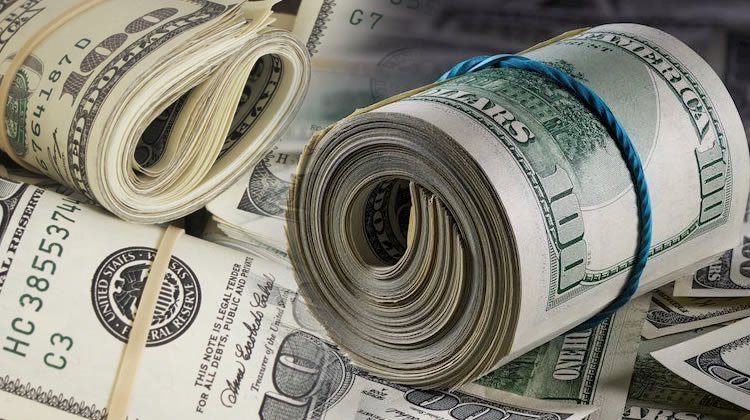
As the naira continues its free fall against the dollar, manufacturers in the country have lamented the worsening scarcity of the United States currency, saying their inability to get the forex they need and the excessive delay in getting the little available are killing their businesses.
However, findings revealed that the scarcity, which has driven up the exchange rate astronomically, was not unconnected with the forthcoming party primaries as many aspirants were said to have mopped up the foreign currency in the banks and the parallel market to woo the delegates.
The President, Association of Bureaux De Change Operators of Nigeria, Alhaji Aminu Gwadabe, told Sunday PUNCH that towards elections in the country, it had become a norm for forex to be volatile, coupled with supply squeeze.
He said the forex market was determined by the forces of demand and supply, explaining that demand had overshot supply.
“It is a market where demand and supply determine the price.
Do not forget that election years are associated with foreign exchange volatility, coupled with supply squeeze. This is also a political year, so you should expect this kind of situation. External reserves, inflation, cost of inputs and the Russia-Ukraine war are also key issues,” Gwadabe stated
Speaking on the impact of the dollar scarcity on the manufacturing sector, the Chairman, Manufacturers Association of Nigeria, Dr Michael Ola Adebayo, told Sunday PUNCH, “There is no forex. If you request say $100,000, they will give you only $1,000, and this may take 90 days.
“The $1,000 represents one per cent of $100,000, which emphasises the level of scarcity.”
He noted that manufacturers were not getting dollars from the banks.
Adebayo noted that the banks often broke requested amounts into pieces for months because forex was not available. He said the lack of foreign exchange had also jerked up production costs of several manufacturing firms, while many had shut down.
At the association’s 48th Annual General Meeting, MAN’s President, Mansur Ahmed, said over 40 per cent of manufacturers could not get dollars to import key inputs, spare parts and machines.
“The forex guidelines and policies have a significant impact on the sector. Now, forex access in the sector is given based on some metrics, which include type of company, the amount being requested, what you are spending it on and sources of the forex, among other things,” Ahmed stated.
Politicians mop up dollars for party primaries
Meanwhile, the primaries of the major political parties, especially the ruling All Progressives Congress and the opposition Peoples Democratic Party, scheduled to hold this week are said to be a major contributor to the dollar scarcity.
Most of the aspirants, especially those contesting the presidential primaries, have been travelling to states to woo delegates. As is customary in the nation’s election history, some aspirants often give dollars to the delegates in the run-up to the primaries and on election days. Some of the delegates are said to often support the highest bidder.
While no aspirant has openly admitted sharing dollars to delegates, the practice is believed to be commonplace in the nation’s electoral process.
While the official exchange rate on the website of the Central Bank of Nigeria remained N415.58/$ as of Friday, The PUNCH had reported on Tuesday that the dollar exchanged for N600, sparking fears of a further devaluation of the nation’s currency.
We don’t bribe to get votes – Saraki, Amaechi
Two presidential aspirants, Bukola Saraki and Rotimi Amaechi, have denied being responsible for the scarcity of dollars. They said they would rely solely on their goodwill to get the votes of delegates at their parties’ primaries.
Amaechi told Sunday PUNCH, “I go to members of our party and tell them what I have to offer. I tell them what I have done before and what I am doing now. That is all it takes. I have done things that are feasible for people to see.
“There is no need to go and purchase dollars with the hope of buying their votes. In any case, how many people will you bribe to get elected? So, count me out of those buying dollars to bribe.”
Saraki, on his part, said, “Nigerians are too sophisticated to be bought with money. It is ridiculous to assume that we will buy dollars with the hope of bribing delegates. I am very close to the people and I do not need to buy them anything before they vote for me.”
Apart from the mopping up by politicians, economists and finance experts told Sunday PUNCH that there were other factors responsible for the severe dollar crunch, including uncertainties in the economy and falling external reserves.
The Director of Research and Strategy, Chapel Hill Denham, Mr Tajudeen Ibrahim, said the issue in the foreign exchange market could be attributed to falling external reserves and uncertainties in the economy.
The country’s external reserves fell by $313m in March, according to figures obtained from the CBN.
Foreign exchange inflows into the country are also crashing. They fell by 36.7 per cent in one month to $4.36bn in January, according to latest figures obtained from the apex bank.
CBN, Emefiele’s political interest also major culprits –Experts
Some economists also blamed the CBN’s demand-side economics as a major culprit. Demand-side economics, in this context, deals with the method of focusing too much attention on the management of demand for dollars, rather than on earning it.
Before Prof Doyin Salami was appointed by the President, Major General Muhammadu Buhari (retd), as his Chief Economic Adviser, he had lampooned the CBN for focusing too much on demand management, rather than exploring ways of earning dollars.
Speaking on the issue, the Chief Executive Officer, Centre for the Promotion of Private Enterprise, Dr Muda Yusuf, stated that the CBN was not giving the foreign exchange market a chance it required to operate.
He said, “The CBN’s current approach will continue to deepen distortions in the economy, perpetuate round-tripping, fuel speculation, suppress forex supply and boost underground economy.
“Unprecedented disparities between the official and parallel market exchange rates have created grave distortions and dislocations in the economy. The disparity in rates has created a paradise for forex brokers and currency speculators. The business of forex round-tripping is also flourishing.”
On his part, the CEO of Jon Tudy Enterprises, a small-scale business, Jon Kachikwu, who exports foods to the United States, told Sunday PUNCH that the CBN’s move to stop exporters from taking their repatriated forex was encouraging diversion of dollars and reducing export inflows into Africa’s largest economy.
“The CBN wants exporters who repatriate dollars to take their money in naira at the official rate. Why will we take our money at that rate when we buy raw materials and other products at the parallel market rate?” he asked, saying many exporters were now diverting their earned forex to other routes to beat the apex bank’s rule.
Copyright PUNCH.
All rights reserved. This material, and other digital content on this website, may not be reproduced, published, broadcast, rewritten or redistributed in whole or in part without prior express written permission from PUNCH.
Contact: [email protected]





